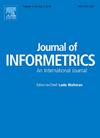科学合作中的知识可替代性和互补性
IF 3.4
2区 管理学
Q2 COMPUTER SCIENCE, INTERDISCIPLINARY APPLICATIONS
引用次数: 0
摘要
了解科学合作中的可替代性和互补性对于降低团队建设成本、提高团队研究绩效具有重要意义。在本文中,科学合作中的知识可替代性表征了(再)组合过程中共享的相似属性,而知识互补性则描述了不同知识组合所产生的协同效应。本文旨在以美国物理学会数据集为基础,探讨知识可替代性和互补性对科研绩效的影响。总体而言,我们发现知识可替代性对科学家的研究绩效有负面影响,而知识互补性则有正面影响。然而,分析表明,知识互补性与研究绩效之间的正相关关系只存在于小规模团队的科学家身上,而大规模团队的科学家受知识互补性的影响并不显著。本文为团队组建和管理提供了新的视角和实用见解。本文章由计算机程序翻译,如有差异,请以英文原文为准。
Knowledge substitutability and complementarity in scientific collaboration
Understanding the substitutability and complementarity in scientific collaboration is of great significance to reduce the costs of team building and enhance the team's research performance. In this paper, knowledge substitutability in scientific collaboration characterizes similar properties shared during the (re)combination process, and knowledge complementarity describes the synergistic effect created by different knowledge combinations. This paper aims to explore the influence of knowledge substitutability and complementarity on research performance based on the American Physical Society dataset. Overall, we find that knowledge substitutability negatively influences scientists’ research performance, while knowledge complementarity has a positive effect. However, the analysis reveals that the positive correlation between knowledge complementarity and research performance only exists for scientists with small-sized teams, while scientists with large-sized teams are not significantly influenced by the complementarity. This paper provides a new perspective and practical insights into team formation and management.
求助全文
通过发布文献求助,成功后即可免费获取论文全文。
去求助
来源期刊

Journal of Informetrics
Social Sciences-Library and Information Sciences
CiteScore
6.40
自引率
16.20%
发文量
95
期刊介绍:
Journal of Informetrics (JOI) publishes rigorous high-quality research on quantitative aspects of information science. The main focus of the journal is on topics in bibliometrics, scientometrics, webometrics, patentometrics, altmetrics and research evaluation. Contributions studying informetric problems using methods from other quantitative fields, such as mathematics, statistics, computer science, economics and econometrics, and network science, are especially encouraged. JOI publishes both theoretical and empirical work. In general, case studies, for instance a bibliometric analysis focusing on a specific research field or a specific country, are not considered suitable for publication in JOI, unless they contain innovative methodological elements.
 求助内容:
求助内容: 应助结果提醒方式:
应助结果提醒方式:


